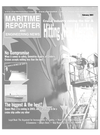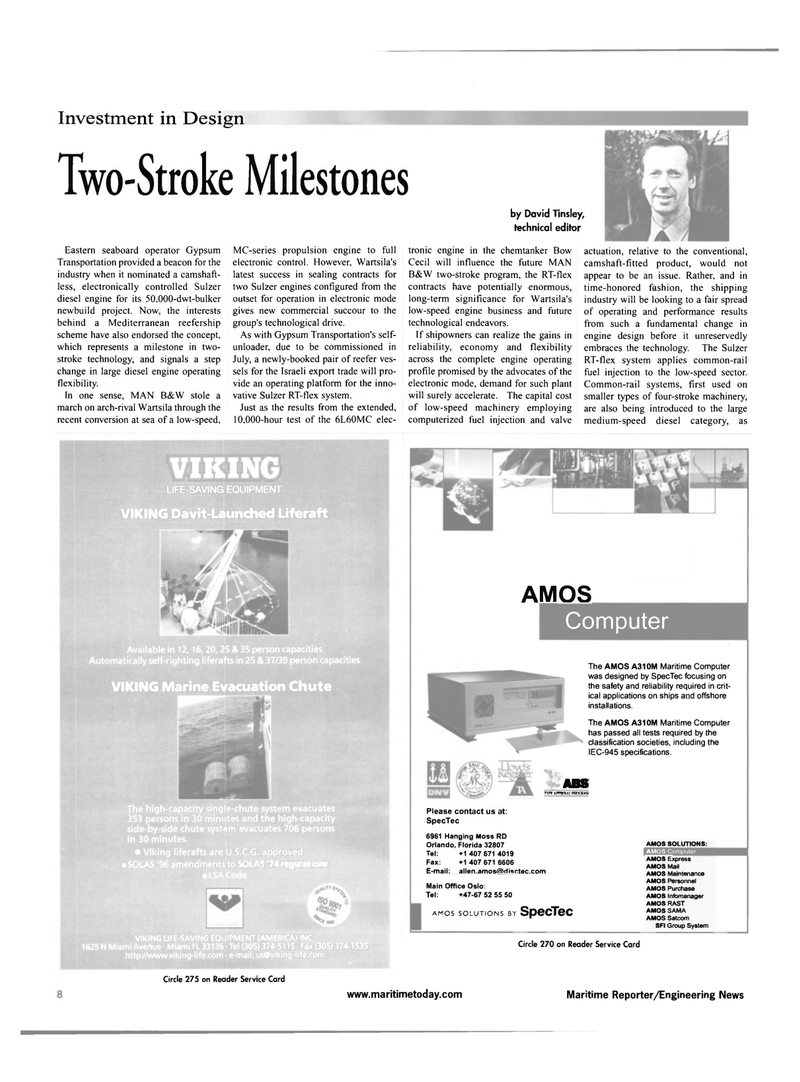
Page 8: of Maritime Reporter Magazine (February 2001)
Read this page in Pdf, Flash or Html5 edition of February 2001 Maritime Reporter Magazine
Investment in Design
Two-Stroke Milestones by David Tinsley, technical editor
Eastern seaboard operator Gypsum
Transportation provided a beacon for the industry when it nominated a camshaft- less, electronically controlled Sulzer diesel engine for its 50,000-dwt-bulker newbuild project. Now, the interests behind a Mediterranean reefership scheme have also endorsed the concept, which represents a milestone in two- stroke technology, and signals a step change in large diesel engine operating flexibility.
In one sense, MAN B&W stole a march on arch-rival Wartsila through the recent conversion at sea of a low-speed,
MC-series propulsion engine to full electronic control. However, Wartsila's latest success in sealing contracts for two Sulzer engines configured from the outset for operation in electronic mode gives new commercial succour to the group's technological drive.
As with Gypsum Transportation's self- unloader, due to be commissioned in
July, a newly-booked pair of reefer ves- sels for the Israeli export trade will pro- vide an operating platform for the inno- vative Sulzer RT-flex system.
Just as the results from the extended, 10,000-hour test of the 6L60MC elec- tronic engine in the chemtanker Bow
Cecil will influence the future MAN
B&W two-stroke program, the RT-flex contracts have potentially enormous, long-term significance for Wartsila's low-speed engine business and future technological endeavors.
If shipowners can realize the gains in reliability, economy and flexibility across the complete engine operating profile promised by the advocates of the electronic mode, demand for such plant will surely accelerate. The capital cost of low-speed machinery employing computerized fuel injection and valve actuation, relative to the conventional, camshaft-fitted product, would not appear to be an issue. Rather, and in time-honored fashion, the shipping industry will be looking to a fair spread of operating and performance results from such a fundamental change in engine design before it unreservedly embraces the technology. The Sulzer
RT-flex system applies common-rail fuel injection to the low-speed sector.
Common-rail systems, first used on smaller types of four-stroke machinery, are also being introduced to the large medium-speed diesel category, as
AMOS
Computer
The AMOS A310M Maritime Computer was designed by SpecTec focusing on the safety and reliability required in crit- ical applications on ships and offshore installations.
VIKING
LIFE-SAVINd EQUIPMENT
VIKING Davit-Launched Liferaft
Available in 12,16,20, 25 & 35 person capacities
Automatically self-righting liferafts in 25 & 37/39 person capacities
VIKING Marine Evacuation Chute
The high-capacity single-chute system evacuates 353 persons in 30 minutes and the high-capacity side-by-side chute system evacuates 706 persons in 30 minutes. • Viking liferafts are U.S.C.G. approved •SOLAS '96 amendmentsito SOLAS '74 regulations
VIKING
VIKING UFE-SAVING EQUIPMENT (AMERICA) INC. 1625 N Miami Avenue • Miami FL 33136 Tel (305) 374-5115 Fax (305) 374-1535 http://www.viking-life.com • e-mail: us®viking-Iife.com
The AMOS A310M Maritime Computer has passed all tests required by the classification societies, including the
IEC-945 specifications.
MS nTEAPrroaipaicmi
Please contact us at:
SpecTec 6961 Hanging Moss RD
Orlando, Florida 32807
Tel: +1 407 671 4019
Fax: +1 407 671 6606
E-mail: [email protected]
Main Office Oslo:
Tel: +47-67 52 55 50
AMOS SOLUTIONS BY SpecTec
AMOS SOLUTIONS:
AMOS Computer
AMOS Express
AMOS Mail
AMOS Maintenance
AMOS Personnel
AMOS Purchase
AMOS Inlbmanager
AMOS RAST
AMOS SAMA
AMOS Satcom
SFI Group System
Circle 270 on Reader Service Card
Circle 275 on Reader Service Card www.maritimetoday.com Maritime Reporter/Engineering News

 7
7

 9
9
